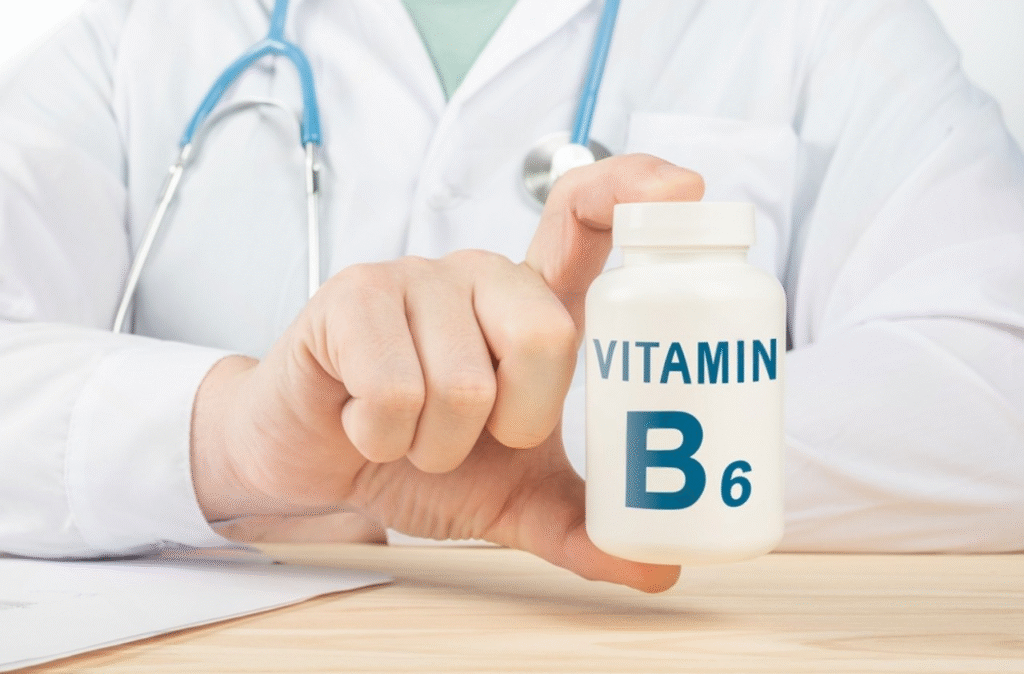Have you ever wondered what vitamin B6 is? Why does it seem like everyone is talking about it in terms of health and nutrition?
Vitamin B6 (pyridoxine) is a water-soluble B vitamin that our bodies need for dozens of important functions. It’s quietly running the show behind the scenes. From keeping your brain sharp to helping your body convert food into energy. Let’s pull back the curtain and discover everything you need to know about this vitamin.

What is Vitamin B6?
Vitamin B6, also known as pyridoxine. It is a water-soluble vitamin. The body cannot produce itself. It is essential for numerous bodily functions. It means you have to get it through food or supplements. It’s a member of the B-complex family, which is all about converting what you eat into fuel.
The Different Forms
Vitamin B6 is not an only one compound, it is actually a group of chemically similar compounds such as:
- Pyridoxine
- Pyridoxal
- Pyridoxamine
Each form plays a unique role in the body, but all are eventually converted into the active form “pyridoxal 5’-phosphate (PLP)”.
Why is Vitamin B6 So Important?
Vitamin B6 is water-soluble and the body can not store it for a longer time. That is why taking adequate amounts regularly can make it like a multitasking personal assistant. The roles or tasks the vitamin B6 plays in the body are the following:
- It can improve mood and reduce symptoms of depression.
- It can promote brain health and reduce the risk of Alzheimer’s. Alzheimer’s disease is a brain disorder that gradually destroys memory and thinking abilities, eventually eliminating the ability to perform even the simplest tasks.
- It can prevent and treat anemia by helping with hemoglobin production.
- It can be useful in treating PMS symptoms.
- It can help treat nausea during pregnancy.
Signs You Might Be Low on B6
Vitamin B6 deficiency is not very common. But it happens and when it does, your body sends some clear SOS signals. The symptoms, include physical, psychological, and cognitive, are follows as:
- Fatigue or low energy
- Cracked lips
- Sore, swollen tongue
- Weak immune system
- Tingling in hands and feet
- Irritability
- Depression
- Confusion
- Memory issues
Who’s at Risk?
Some people are more likely to be deficient in this vitamin. Especially if there are some health issues or lifestyle factors at play.
- Pregnant women
- Elder adults
- People with kidney problems or alcoholism
How Much Do You Really Need?
The intake amount of vitamin B6 depends on your age, sex, lifestyle, and life stage. According to NIH the recommended intake amounts (RIA) are listed in the following table:
| Life stage | RIA |
| Adults (19-50 years) | 1.3 mg/day |
| Men over 50+ | 1.7 mg/day |
| Women 50+ | 1.5 mg/day |
| Pregnant women | 1.9 mg/day |
| Breastfeeding | 2.0 mg/day |
Best Food Sources
Nature has packaged B6 in a wide variety of animal and plant-based foods.
Animal-Based Sources
- Chicken breast
- Turkey
- Tuna
- Salmon
- Beef liver
- Eggs
Plant-Based Sources
- Bananas
- Chickpeas
- Potatoes
- Spinach
- Fortified cereals
- Sunflower seeds
How to Naturally Boost Your B6 Levels?
If you are lacking B6 vitamin and want to boost your B6 levels. You should follow the following steps:
- Eat a variety of whole foods
- Include lean meat, legumes or beans daily.
- Snack on nuts and seeds
- Reduce drinking alcohol
Talk to your doctor before starting any supplement
When Supplements Make Sense?
Taking supplements make sense based on different facts:
- If you are pregnant woman
- You have issues in metabolism
- You follow a very restricted diet low in this vitamin
- You take medications that deplete B6
Choosing the Right Supplements
Choosing the right supplements involves assessing your individual needs, reading labels carefully, and prioritizing quality. Look for B6 supplements on the label as pyridoxine HCl or P-5-P. Bonus if it’s part of a well-rounded B-complex supplement. It is also important to consult a healthcare professional and consider potential interactions between supplements and medications.
Final Thoughts
Vitamin B6 may not be as well-known as vitamins C or D. But it plays as big a role as it can. B6 is working 24/7 to keep you in balance. Ensuring adequate intake can help from energy levels to your mood, metabolism, and even immune function. Remember, while B6 is important, moderation is key; overconsumption can lead to negative effects. Always consult a healthcare professional before starting any new supplement regimen.
FAQs
1. Can I take vitamin B6 every day?
Yes, but it’s best to stay within the recommended daily intake unless advised otherwise by a healthcare provider.
2. Is vitamin B6 good for anxiety or stress?
B6 helps your body produce calming neurotransmitters like serotonin and GABA, which can help manage stress and anxiety.
3. Do bananas really have a lot of vitamin B6?
Absolutely! One medium banana has about 0.4 mg of B6, which is a nice chunk of your daily needs.
4. What happens if I overdose on vitamin B6?
Long-term high doses (especially over 100 mg/day) can cause nerve damage, numbness, and difficulty walking.
5. Are B6 supplements better as P-5-P or pyridoxine?
Both are effective, but P-5-P is the active form your body uses directly, which can be beneficial for people with absorption issues.



Pingback: Actiwel Tablets Explained: Uses & Side Effects - The Nutrio